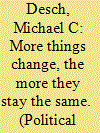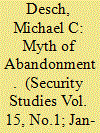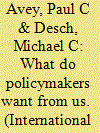| Srl | Item |
| 1 |
ID:
080672


|
|
|
|
|
| Publication |
2007.
|
| Summary/Abstract |
Why has the United States, with its long-standing Liberal tradition, come to embrace the illiberal policies it has in recent years? The conventional wisdom is that al-Qaida's attacks on the United States on September 11, 2001, and the subsequent war on terrorism have made America less Liberal. The logic of this argument is straightforward: interstate war has historically undermined domestic liberties, and the war on terrorism is causing the United States to follow this well-worn path. This explanation confronts a puzzle, however: illiberal U.S. policies-including the pursuit of global hegemony, launching of a preventive war, imposition of restrictions on civil liberties in the name of national security, and support for torture under certain circumstances-manifested themselves even before the September 11 terrorist attacks and were embraced across the political spectrum. Indeed, it is precisely American Liberalism that makes the United States so illiberal today. Under certain circumstances, Liberalism itself impels Americans to spread their values around the world and leads them to see the war on terrorism as a particularly deadly type of conflict that can be won only by employing illiberal tactics
|
|
|
|
|
|
|
|
|
|
|
|
|
|
|
|
| 2 |
ID:
076842


|
|
|
|
|
| Publication |
2007.
|
| Summary/Abstract |
The rift between U.S. military and civilian leaders did not start with George W. Bush, but his administration's meddling and disregard for military expertise have made it worse. The new defense secretary must restore a division of labor that gives soldiers authority over tactics and civilians authority over strategy -- or risk discrediting civilian control of the military even further.
|
|
|
|
|
|
|
|
|
|
|
|
|
|
|
|
| 3 |
ID:
108847


|
|
|
| 4 |
ID:
136707


|
|
|
|
|
| Summary/Abstract |
Andrew Krepinevich and Barry Watts’s The Last Warrior seeks to canonize longtime Defense Department strategist Andrew Marshall. But his record was far more mixed than his incense burners are prepared to admit.
|
|
|
|
|
|
|
|
|
|
|
|
|
|
|
|
| 5 |
ID:
098177


|
|
|
| 6 |
ID:
076987


|
|
|
|
|
| Publication |
2006.
|
| Summary/Abstract |
The Holocaust has become an important part of the everyday discourse of American life. Indeed, it has become one of the central historical analogies for thinking about U.S. foreign policy in the post-Cold War world. The received wisdom about the Holocaust among most Americans is that the United States and the rest of the civilized world turned away Jews seeking to escape Nazi Germany before World War II, and then sat idly by while the Third Reich murdered nearly 6 million of them during the course of the war. In light of this reprehensible indifference, the United States shares some responsibility for the Holocaust, and it must "never again" allow large numbers of people to be slaughtered because of their race, ethnicity, or religion. Historical analogies are ubiquitous in foreign policy debates. Not only do they routinely shape state behavior, they usually do so for the worse. Hence, we should be wary of all historical analogies and examine them carefully to make sure they are based on sound history and used wisely by policymakers. The widely accepted Holocaust analogy illustrates, in my view, both how analogies are frequently based on a faulty reading of history and that policies based on them have not always served U.S. interests.
|
|
|
|
|
|
|
|
|
|
|
|
|
|
|
|
| 7 |
ID:
133642


|
|
|
|
|
| Publication |
2014.
|
| Summary/Abstract |
What do the most senior national security policymakers want from international relations scholars? To answer that question, we administered a unique survey to current and former policymakers to gauge when and how they use academic social science to inform national security decision making. We find that policymakers do regularly follow academic social science research and scholarship on national security affairs, hoping to draw upon its substantive expertise. But our results call into question the direct relevance to policymakers of the most scientific approaches to international relations. And they at best seriously qualify the "trickle down" theory that basic social science research eventually influences policymakers. To be clear, we are not arguing that policymakers never find scholarship based upon the cutting-edge research techniques of social science useful. But policymakers often find contemporary scholarship less-than-helpful when it employs such methods across the board, for their own sake, and without a clear sense of how such scholarship will contribute to policymaking.
|
|
|
|
|
|
|
|
|
|
|
|
|
|
|
|